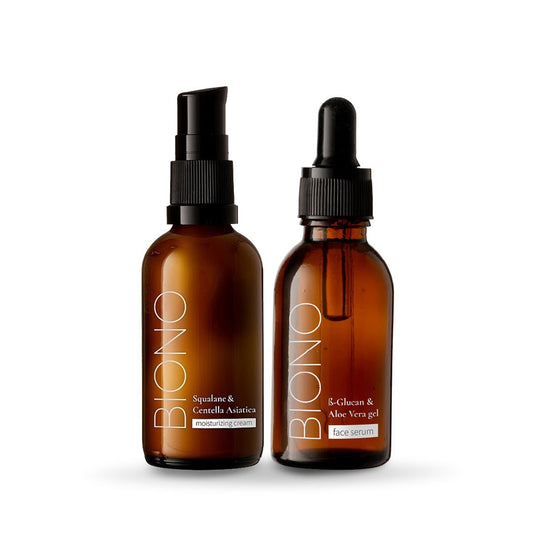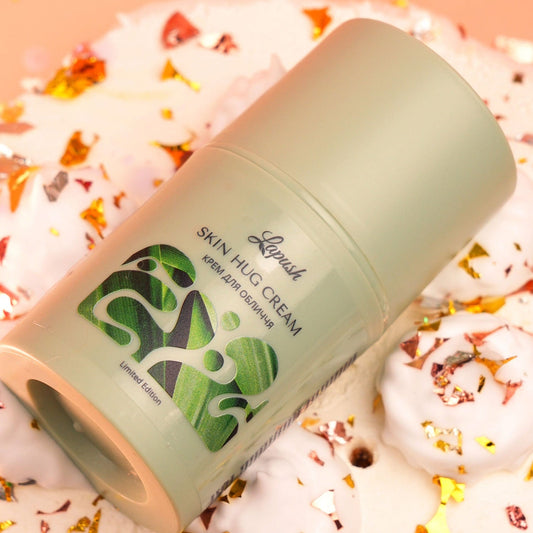
Personalized skin care: your path to a perfect face
In a world where beauty brands offer thousands of products every day, it’s easy to get lost and spend money on products that don’t work for you. Personalized skincare is not a marketing gimmick, but a science-based approach that takes into account the unique characteristics of your skin, lifestyle, and environment. It is precisely the individual selection of cosmetics that allows you to get visible results in just a few weeks, saving you time and budget.
What is personalized skincare and why does it work?
Personalized skin care is based on the understanding that each person has a unique combination of factors that affect the condition of the epidermis. It is not just a determination of skin type - it is a deep analysis of genetic characteristics, hormonal background, lifestyle, climatic conditions and even diet. Modern cosmetology moves away from universal solutions, offering instead a targeted approach that takes into account all the nuances.
Personalized care works through precision: when you use facial cosmetics that are tailored to your needs, the active ingredients work at their best. For example, someone with oily skin and acne needs completely different ingredients than someone with dry and sensitive skin. A personalized approach avoids irritation, allergic reactions, and wasteful spending on products that simply don’t suit your skin type.
The effectiveness of this approach has been confirmed by research: according to dermatologists, a properly selected beauty routine improves skin condition by 60-80% within the first month of use. This is because each step of facial care performs its specific function, and the ingredients do not conflict with each other, but on the contrary, enhance each other's effects.

How to identify your skin's needs: the first step to personalization
Determining your skin type is the foundation of any effective skincare routine. The classic classification includes normal, oily, dry, combination and sensitive skin, but in reality, everything is much more complicated. Your skin can change depending on the season, stress, hormonal fluctuations or even the quality of the water you wash with. That is why personalized skincare involves regular reassessment of the condition of the epidermis.
A professional analysis may include testing for pH balance, hydration levels, sebaceous gland activity, and inflammation. However, you can also do a basic diagnosis at home: clean, makeup-free skin 30 minutes after cleansing will tell you a lot. A feeling of tightness indicates dryness, oily shine in the T-zone indicates combination skin, and even hydration without discomfort indicates normal skin.
It is also important to pay attention to additional problems: enlarged pores, pigmentation, first wrinkles, couperose or post-acne. Each of these features requires the inclusion of specific active ingredients in your beauty routine. For example, to combat pigmentation, vitamin C and niacinamide are needed, while retinoids and peptides work better to reduce wrinkles. Individual care takes into account all these nuances.
Basic principles of building an individual beauty routine
Effective skincare always consists of several sequential steps, performed in a specific order. The classic scheme includes cleansing, toning, moisturizing and protecting, but a personalized approach can add intermediate steps depending on your needs. It is important to understand that more products does not mean better results - sometimes a minimalist routine of 3-4 products works more effectively than multi-step care.
Morning routine for different skin types:
- Gentle cleansing with gel or foam (for oily skin) or milk (for dry skin)
- Toner or essence to balance pH and prepare for the next steps
- Serum with active ingredients tailored to your concerns
- Moisturizing cream with a texture tailored to your skin type
- Sunscreen with an SPF of at least 30 (a must for all types)
Your evening beauty routine can be more intense, as it is at night that your skin is most actively restored. After removing makeup and double cleansing, you can use more concentrated products: retinol, AHA/BHA acids, peptide serums or nourishing masks. Personalized skin care allows you to alternate active ingredients, preventing addiction and irritation, while achieving maximum results.
The key to success is consistency and patience. Facial cosmetics take time to work: on average, it takes 4-6 weeks of regular use to see lasting changes. Don’t expect instant results or constantly change products — give your skin time to adapt and respond to your facial care.

Ingredients that matter: how to choose cosmetics consciously
Understanding the ingredients in beauty products is a superpower for today’s consumer. Personalized skincare is impossible without knowing which ingredients you need and why. Ingredients are listed on labels in descending order of concentration, so the first five ingredients are the most important. Learn how to read ingredients and you’ll never buy a product again just because of the pretty packaging or advertising.
For oily and problematic skin, salicylic acid, niacinamide, zinc, and retinol are effective — these components regulate sebum, cleanse pores, and have an anti-inflammatory effect. Dry skin responds to hyaluronic acid, ceramides, squalane, and oils — they create a protective barrier and retain moisture. But sensitive skin needs soothing ingredients: centella asiatica, panthenol, allantoin, and bisabolol, which relieve redness and strengthen the epidermis's defenses.
Anti-aging ingredients deserve special attention in individual care. Retinoids remain the gold standard for stimulating collagen, but they should be introduced gradually. Vitamin C fights oxidative stress and evens out tone, peptides maintain elasticity, and AHA acids renew the skin surface. It is important not to mix incompatible ingredients: for example, retinol and acids are best used on different evenings, and vitamin C is best used exclusively in the morning under SPF.
Seasonal adaptation: how to change your skin care throughout the year
Personalized skin care must take into account the change of seasons and climatic conditions. What worked perfectly in the summer may not be enough in the winter, and vice versa. In the summer, when humidity is high and the sun is active, the skin needs lighter textures, enhanced protection from UV rays and sebum control. Winter facial care focuses on protection from cold, wind and dry indoor air.
In autumn and spring, during the transition period, the skin often becomes more sensitive and unstable. This is the ideal time to introduce active ingredients such as retinoids or acids, as solar activity is lower. Spring skin detoxification after winter can include peels and deep cleansing, while autumn is the time to strengthen the protective barrier before the cold.
Seasonal changes in beauty routine:
- Summer — light gel textures, SPF 50+, mattifying agents, more hydration due to water loss
- Autumn — introduction of acids and retinol, strengthening the barrier with ceramides, preparation for cold weather
- Winter — thicker creams, oils, thermal water for comfort, protection from frost
- Spring — skin renewal with peels, detox masks, transition to lighter textures, vitamin C for radiance
Individual care also takes into account your lifestyle: if you spend a lot of time in air-conditioned rooms, your skin needs extra hydration even in the summer. If you travel, take mini versions of your favorite products with you and don't forget to adapt to the new climate. Facial cosmetics should be a flexible system, not a rigid set of rules.

Skincare mistakes that ruin even the best cosmetics
Even the most expensive personalized skincare routine won't work if you make critical mistakes in your daily routine. The first and most common is over-cleansing with harsh products. That "squeaky clean" feeling after washing actually signals a breakdown in the skin's protective barrier. Your skin should feel comfortable after cleansing, without feeling tight or dry.
The second mistake is using too many active ingredients at the same time or ignoring the rules of their compatibility. If you apply retinol, vitamin C, several types of acids and peptides every day, your skin is likely in a state of chronic irritation. Individual care means intelligently alternating active ingredients and listening to your skin's reactions. Redness, peeling, itching are signals that something is wrong.
The third mistake is neglecting SPF or not applying enough. Sun protection is not an option, but a mandatory final step of any morning facial care. Even in winter, even in cloudy weather, even if you are indoors all day long - UV rays penetrate through windows and damage collagen. Personalized skin care without adequate sun protection is a waste of time and money, because photoaging occurs every day.
Personalization technologies: from AI diagnostics to DNA tests
The modern cosmetics industry is actively implementing technologies for maximum personalization. AI applications analyze photos of your skin, identify problem areas, track the dynamics of changes and recommend routine corrections. Some brands offer online consultations with virtual dermatologists who take into account not only the appearance of your skin, but also your medical history, lifestyle and even stress level.
DNA tests for selecting cosmetics are no longer fiction, but reality. By analyzing genetic markers, laboratories determine your predisposition to premature aging, pigmentation, inflammation, and loss of elasticity. Based on this data, personalized formulas are created that work to prevent problems. Such individual care reaches a fundamentally new level - from a reactive to a preventive approach.
Even without expensive technology, you can create an effective beauty routine by studying your skin’s reactions and keeping a skincare diary. Write down what products you use, how your skin reacts, what external factors affect its condition. After a few months, you will see clear patterns and be able to optimize your facial care better than any algorithm. Personalized skincare is about constant learning and adaptation.
Budget and Personalization: How to Get Results Without Overpaying
It’s a common myth that effective personalized skincare costs a fortune. In reality, the key to success isn’t in the price of the products, but in their rightness for your skin type and needs. A mass-market brand with the right ingredients in the right concentration will work better than a premium cream that just doesn’t suit you. A smart approach is to invest in 3-4 high-quality basic products, rather than buying dozens of products for the sake of variety.
Prioritize your skincare spending like this: Cleanser and SPF are the biggest, as they’re used daily and quality is critical. The middle category is moisturizer and serums with active ingredients. The smallest investments can be in masks and additional products that you use occasionally. Personalized care doesn’t mean buying everything on the market—it means buying what your skin really needs.
How to optimize your spending on facial cosmetics:
- Choose multifunctional products (e.g., a cream with SPF or a serum with niacinamide and peptides)
- Buy basic products from proven mass market brands, and assets from specialized ones
- Don't waste money on toner unless your skin needs extra pH balancing.
- Use oils instead of expensive night creams (if your skin tolerates them)
- Look for alternatives: drugstore brands often offer quality formulas at an affordable price
Remember, personalized skincare is a marathon, not a sprint. It's better to buy one quality product a month and use it all up than to amass a collection of half-opened jars that don't work together. Your beauty routine should not only be effective, but also financially comfortable so you can maintain it long-term.

How to track progress and adjust your facial care
The effectiveness of personalized care cannot be assessed without systematic monitoring of results. Taking photos of your face in the same lighting every two weeks is the most objective way to see changes that may not be noticeable every day. Pay attention to the following parameters: even tone, pore size, amount of inflammation, depth of wrinkles, overall texture and radiance of the skin. Comparing photos after a month or two, you will clearly see what is working.
It’s also important to listen to your feelings: comfortable skin is healthy skin. If your individual care regimen causes tightness, burning, excessive oiliness or flaking, something needs to be changed. Don’t be afraid to adjust your routine: replace one product, reduce the frequency of using actives, or add a missing step. Skincare is a constant dialogue between you and your epidermis.
Consulting with a dermatologist or esthetician every six months or a year will help you assess your skin’s condition professionally and adjust your course. This is especially important if you are using active ingredients, starting to notice new problems, or planning to make major changes to your beauty routine. Personalized skin care is most effective when it combines at-home discipline with professional expertise.
Bottom line: your skin, your rules
Personalized skincare is not a luxury, but a necessity for anyone who wants healthy, radiant skin without wasting money on ineffective products. Understanding your skin type, choosing the right ingredients, building a consistent beauty routine, and being willing to adapt your skincare to changes is the formula for success. There is no one-size-fits-all beauty recipe, but there is your own individual path that takes into account all the specifics of your skin, lifestyle, and goals.
Start small: identify your skin type, choose 3-4 basic products and give them time to work. Observe reactions, adjust what doesn’t work, and don’t be afraid to experiment within reasonable limits. Facial cosmetics should bring pleasure and tangible results, not turn into daily stress. Your skin is unique — and it deserves care created just for it.















